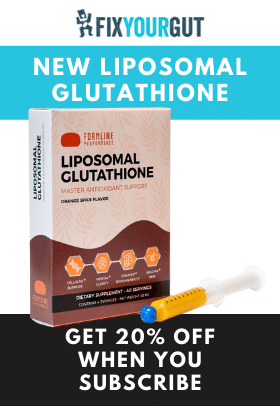Vitamin C is a superior micronutrient and great antioxidant, it can donate one of its electrons to neutralize a free radical, and some say that going without it could be lethal, but what happens when you take too much of it? There is new evidence coming out that may lead you to consider lowering your dose of vitamin C.
- Upset Stomach
In nature, we get vitamin C from fruits and vegetables that are loaded with fiber. This allows for easier absorption of vitamin C because it gives the plasma to uptake the nutrient without making as much direct contact with the tissues of the intestines. When you take a supplemental form (especially on an empty stomach) it is concentrated, and the tissues can become irritated. Then, the body responds by flushing the vitamin C out with water creating an osmotic effect1.
The diarrhea that goes along with this is a nuisance, but not your biggest problem! When the epithelial cells of the intestines allow water into the digestive tract, the tight junctions open (the space in between the cells). While the tight junctions are open, toxins can escape through the openings and get into your blood stream.
- You’re Taking the Wrong form of Vitamin C
According to cancer researchers, much of the industrial vitamin C that they are getting to treat patients is in the wrong form.2 For vitamin C to be effective, it must be in its reduced form (L-ASC, ascorbate), but most of the time, suppliers are producing the oxidized form dehydroascorbic acid, DHA). Humans are one of the only vertebrates that do not make their own vitamin C, so the transport mechanisms are different (GLUT-2, and GLUT-8 transport sites). These transport mechanisms were evolved over thousands of years to allow for natural vitamin C to enter the body, not the oxidized form made by most supplement companies. This reduces the absorption and can lead to health problems.
- Iron Oxidation
Iron is an important mineral for just about every organism. We use it to carry oxygen through the blood stream so that the mitochondria can perform a function called glycolysis which produces energy. Bacteria also use iron, and it is an important mineral in the formation of biofilms which provide them shelter and protection. Bacteria require iron in a certain form (ferrous iron), and unabsorbed vitamin C has the unfortunate side effect of reducing ferric iron (F+3) into ferrous iron (F+2)3. If you are having issues with SIBO, you may want to try iron chelation to prevent the bacteria from using your vitamin C supplement to strengthen their biofilms.
- Homeostasis
The half life of vitamin C in the plasma is estimated at only about thirty minutes.4 That’s how long it takes for the body to use it up to clear out free radicals! In the meanwhile, consumption of antioxidants can lead to the reduction of the liver from producing a compound called glutathione, which is the body’s master antioxidant. Glutathione is superior to vitamin C because it can be recycled and used again. If you consume too much vitamin C and over a long enough period, your body will compensate by producing less glutathione—which defeats the purpose of taking vitamin C in the first place!
- Absorption is Not Constant
Your body absorbs vitamin C as it needs it. Since the body is in constant fluctuation, sometimes it absorbs more, sometimes less.5 If you are ill, under stress, traveling, or injured, your body will activate more vitamin C transport proteins which will lead to greater absorption. If you are rested, well, and happy, your body makes less of them meaning that more vitamin C will get left behind in the intestines which could cause health issues. Maybe we should try to get most of our vitamin C from food during these times and only supplement when we need to?
Many people have poor diets and don’t get enough vitamin C. Please don’t exacerbate your health issues by consuming an excessive dose! For most people 200mg is more than enough, and if you need more, spread out your doses throughout the day, and always take vitamin C with food.







What Vitamin C supplements have the reduced form (L-ASC, ascorbate) when one needs more than relying upon food? Thank you!
Is it best to use camu camu or pomegranate powder as a C source?
How does one know if a product is reduced or oxidized Vitamin C? Does this apply to liposomal Vitamin C and ascorbyl palmitate aw well?
I am certified in functional genomic analysis/health coaching, most appreciative for this article. I’ve been ‘noodling’ the sleep effects of biofilms in the nasal passages, how to reduce them in tandem with gut integrity/biodiversity. We look at iron (not what’s in the blood, but what gets into the cell/tissue). Excess iron, excess Vitamin C contributing to nasal biofilm is worth a look!
Vitamin C has been shown to be more effective at enhancing glutathione levels in humans than NAC. May I suggest you examine the science behind Pureway C and the absorption/half-life studies done on it. Apolactoferrin is the most compelling iron chelator that I know of. I speak from personal experimentation.
Vitamin C elevates red blood cell glutathione in healthy adults:
https://pubmed.ncbi.nlm.nih.gov/8317379/
Vitamin C augments lymphocyte glutathione in subjects with ascorbate deficiency
https://pubmed.ncbi.nlm.nih.gov/12499341/
Low Nourishment of Vitamin C Induces Glutathione Depletion and Oxidative Stress in Healthy Young Adults:
https://www.ncbi.nlm.nih.gov/pmc/articles/PMC4596346/
Vitamin C is an essential antioxidant that enhances survival of oxidatively stressed human vascular endothelial cells in the presence of a vast molar excess of glutathione: https://pubmed.ncbi.nlm.nih.gov/17403685/
Direct correlation of glutathione and ascorbate and their dependence on age and season in human lymphocytes:
https://academic.oup.com/ajcn/article/71/5/1194/4729285